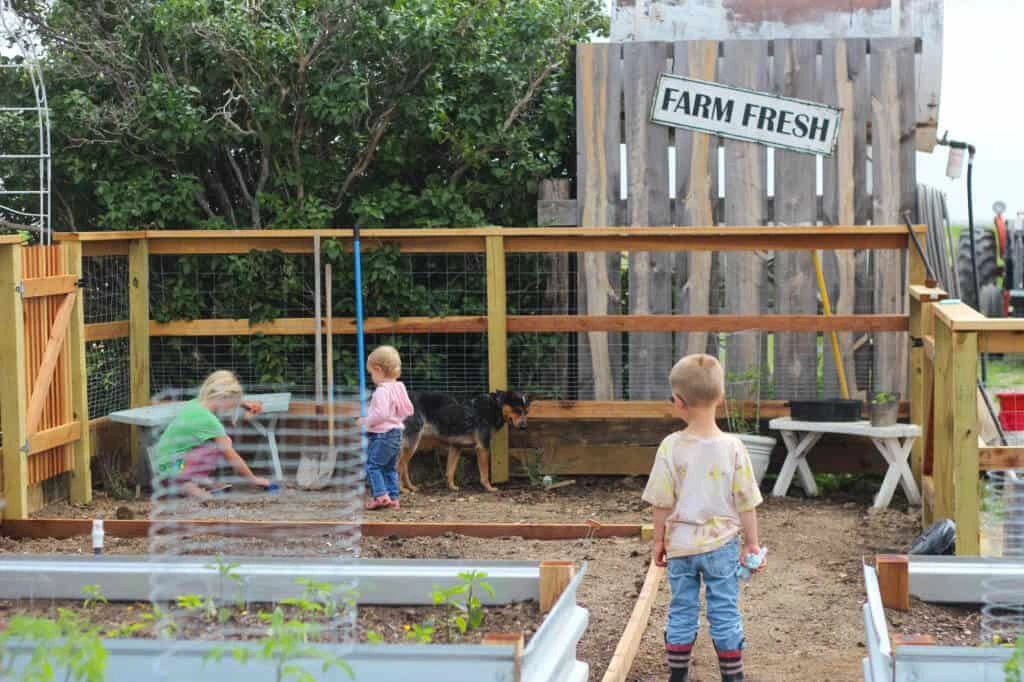7 Lessons My Kids Have Learned from Homestead Life
Look, if someone had told me that a random conversation at Applebee’s about cattle, land ownership, and the adventures of homesteading with kids would basically dictate the next two decades of my life, I probably would have ordered dessert and changed the subject. But there I was, trying not to drool ranch dressing on myself while this guy I barely knew laid out his entire agricultural fantasy like he was planning a military operation.
Here’s the thing that’s absolutely hilarious: neither of us had any business talking about cattle or homesteading. Christian grew up in town. I grew up in town. Between the two of us, our farming expertise consisted of maybe helping someone’s grandma with her tomato plants one summer. But something about those ridiculous dreams just clicked, you know?
Fast forward eleven years, and we’re living on 67 acres in middle-of-nowhere Wyoming with three kids who think everyone has a milk cow in their backyard and considers collecting eggs a legitimate after-school activity. Sometimes I look around at this chaos we’ve created and think, “Well, we certainly committed to the bit.”
But here’s what nobody warns you about when you decide to raise kids on a homestead: they don’t just learn how to milk goats and drive tractors. They absorb these life lessons that most adults are still trying to figure out. And honestly? Watching them develop these skills has been one of the most rewarding parts of this whole adventure.
7 Lessons Homestead Kids Learn

1. Working hard is a gift.
Okay, before you roll your eyes and assume I’m about to launch into some “back in my day, we walked uphill both ways” lecture, hear me out. I’m not saying work should be miserable or that suffering builds character. That’s garbage.
What I am saying is that there’s this incredible satisfaction that comes from physical labor when it’s working toward something you care about. When Prairie Boy helps stack hay bales and then gets to watch our animals munch on that same hay all winter, there’s a connection there that you just can’t get from most modern jobs.
These kids get to experience that moment where you step back, look at what you’ve accomplished, and feel this deep sense of pride. Whether it’s a perfectly cleaned chicken coop or a vegetable garden they helped plant, they’re learning that working toward something meaningful feels completely different than just going through the motions.
2. You don’t need to be entertained.
I swear, if I read one more social media post from parents complaining that there’s “nothing to do” in their town, I might lose my mind. What exactly are we teaching our kids when we act like entertainment is something that happens to them instead of something they create themselves?
My kids haven’t figured out the art of being bored yet, probably because they’re too busy building forts out of hay bales and convincing the barn cats to participate in their elaborate adventure scenarios. When you give kids space and freedom and stop micromanaging their every moment, they discover they’re actually pretty creative little humans.
3. Care for helpless things.
This one gets me every single time. There’s something about watching a tough, rowdy kid become completely gentle with a sick animal that just hits different.
Taking care of animals teaches kids when to be firm and when to be soft, when to push and when to back off. And honestly? Those are pretty crucial skills for dealing with humans too.
4. If you’re a girl, it’s fine to be feminine and girly, and also know how to build fence, drive a stick shift, wrestle calves, and make a mean pie crust.
Prairie Girl looks like she should be starring in a Disney movie with her long blonde braids and sparkly boots. The confidence that comes from knowing you can handle whatever life throws at you? That’s priceless.
5. If you’re a boy, it’s OK to be loud and rough and tumble. (Although it’s generally best to do it outside.)
Can we talk about how modern society seems determined to medicate the energy right out of little boys? Like somehow being loud and physical and full of energy is a character flaw instead of just… being a kid?
Country life gives boys permission to be boys. To wrestle and yell and climb and get absolutely filthy.
6. You can do hard things.
They’re learning opportunities.
Every frustrating moment teaches them that hard doesn’t mean impossible. These are lessons that will serve them for the rest of their lives.
7. Producing food is hard work—appreciate it.
Look, homesteading with kids isn’t always sunshine and perfectly-posed Instagram photos.
But watching them develop these skills and attitudes? That’s worth every challenging moment.
And the best part is, you don’t need 67 acres and a herd of cattle to teach these lessons. Any kid can learn to grow something, care for something, and work toward something meaningful. The specific setting matters way less than the intention behind it.
Because apparently, even the most mundane chores can become epic battles when you’re under ten years old.

Leave a Reply